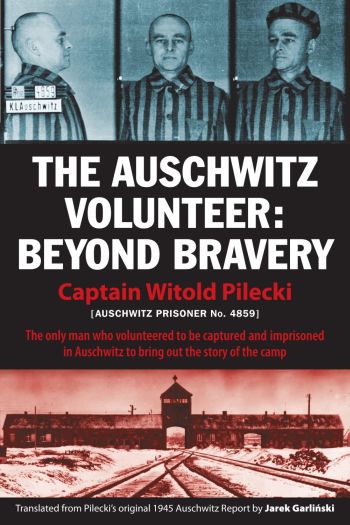| Title: | The Auschwitz Volunteer: Beyond Bravery |
| Author: | Witold Pilecki |
| Editor: | Aquila Polonica |
| Published: | 2012 |
| ISBN: | 9781607720102 |
| Pages: | 401 |
| Review: |
“Were we all… human?” This is what the Polish Captain of the Cavalry Witold Pilecki (1901-1946) asks himself in his memoires about his imprisonment in concentration camp Auschwitz. He points at the large differences between the lives of the prisoners and that of the free civilians outside the camp. When he returned on fine spring days from his work of hard labor in a tannery outside the camp and he observed young couples or mothers behind their prams who strolled lightheartedly in the spring sun. In the meantime a few miles further away, in the extermination camp Birkenau, tens of thousands of bodies of Jews were unearthed from their mass graves and cremated in large open fires. Whilst elsewhere the apple trees blossomed, the smell of burning human flesh polluted the air in and around the camp. Pilecki knew that the Jewish prisoners, that were charged with that horrible cleaning task, themselves had only two weeks left to live - at most. Auschwitz-Birkenau was the place where about one million Jews were murdered. Most of them were cremated immediately after they had been gassed, but a part of them had been buried first. In order to leave no traces of the mass murder, their bodies were later on as yet unearthed and burned, like Pinecki reported. The Roman Catholic officer himself was not imprisoned in Birkenau but in the Stammlager, the so called head camp Auschwitz I, where tens of thousands of his compatriots were kept prisoner under lamentable circumstances. Pilecki himself had ended up here voluntarily. He was an infiltrator of the Polish underground movement, which was called Armia Krajova (home army) from 1942. During a street raid in Warsaw on 19 September 1940 Pilecki had himself arrested. Thereafter he would remain in Auschwitz as a leader of the resistance for 947 days. From the camp he had information carried outside through released or escaped prisoners. And he prepared for a revolt, while he fought to stay alive in the hell which was the camp. Nowadays Pilecki is a national hero in Poland. In order to make his story well-known also outside the Polish country borders, the Los Angeles based editor Aquila Polonica published his memoires in English in 2012. This sober record of his stay and experiences he wrote in 1945, after having escaped from the camp together with two others during the night of 26 to 27 April 1943. A prisoner revolt had never been realized as the allied forces had omitted to drop weapons or to support the uprising in any other way. Also Pilecki’s reports of the mass murder did not persuade the allies to take any action. After his escape he fought in the Polish uprising which had broken out in Warschau on the 1st of August 1944. He was made prisoner of war by the Germans but survived the war. His end was a tragic one because his own communist country fellowmen executed him on 25 May 1948 after having tried him for espionage. From the point of view of a literary creation, the book of Pilecki does not score a high mark. But it has originally not been written for a large public of readers. The author has made his notes really fast and has never had an opportunity to re-edit those during quieter circumstances. The translator, Jarek Garlinski, has chosen to translate the Polish records as authentically as possible into English. He made footnotes in the text wherever he judged these necessary. Although there are books by camp survivors that are written better or more sophisticated, Pilecki’s story has added value. His report familiarizes the readers with the Polish resistance inside the camp and provides now also outside Poland the knowledge about a Polish hero. The book also puts the spotlights on the sufferings also by Polish civilians in Auschwitz in a thrilling way without ignoring the Jewish fate. With his reporting of the horrors of Auschwitz, Pilecki has not been able to achieve anything, but almost seventy years later the message is still unnerving and maybe his book will contribute to the cultivation of tolerance and the diminution of hatred. |
| Rating: |
|
Information
- Translated by:
- Fred Bolle
- Article by:
- Kevin Prenger
- Published on:
- 29-10-2012
- Last edit on:
- 26-12-2012
- Feedback?
- Send it!



